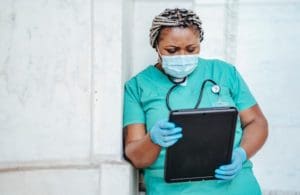
[Photo by Laura James from Pexels]
And yet — for all of the talk about digital transformation, artificial intelligence (AI) and decentralized clinical trials in medicine in recent years — the adoption of those concepts has lagged. “The reality is that we’ve gone after shiny objects in many places,” said Dr. Nirav Shah, chief medical officer of Sharecare (Atlanta, Ga.).
The situation is, however, swiftly changing thanks to the pandemic. Some 44% of pharma, biotech and clinical research professionals have already adopted remote patient monitoring (RPM) or plan to do so in the next 12 months, according to a recent survey from VivaLNK (Campbell, Calif.). Almost two-thirds (65%) of survey respondents reported the pandemic was the primary driver of RPM adoption.
Physicians have witnessed a similar trend with telemedicine, which encompasses telephone and video-based remote visits. “We’ve talked about telemedicine for many, many years,” Shah said, who also a senior scholar at Stanford University. “COVID, overnight, changed the adoption of telemedicine from 0% for primary care visits at Stanford to 75%.”
While telemedicine adoption has fallen from its peak in the early days of the pandemic, there is now an inflection point that has made medical professionals and patients more aware of the possibility of remote care.
Clinical trial shifts have followed a similar trajectory. During the pandemic, many physicians saw the power of remotely gathered health metrics. A patient could answer the Patient Health Questionnaire (PHQ)-9 for depression in a clinic or via a smartphone. Using a smartphone to ask patients about depression symptoms enables potentially more frequent monitoring.
Gathering data via smartphones also enables physicians to better understand how patients’ lived experience affects their health while avoiding phenomena such as white-coat hypertension, where patients’ blood pressure spikes when they physically visit a doctor’s office. “We can get better data using patient-reported outcome measures,” Shah said.
Smartphones paired with artificial intelligence can also provide patients with insightful health information in clinical research. Sharecare, for instance, has explored using machine learning to predict allergy symptom burden and symptom severity for allergic rhinitis.
The smartphone also enables physicians to improve care for underserved and vulnerable populations, Shah said. “There’s a digital divide when it comes to rural broadband use. There’s no digital divide, according to a Pew 2019 survey, when it comes to families owning a smartphone with a cellular plan,” he explained. Using the smartphone to gather patient health information reduces the need for patients in rural areas to travel long distances to seek medical care.
It also can optimize clinical trial retention and data gathering. “In our asthma and allergy study with 2,000 people, we had one person drop out after a year,” Shah said. “We had 10% of patients enrolled in the clinical trial fill out allergy symptoms every single day for a year.”
Remote and hybrid trial designs can also facilitate patient selection. “Traditionally, patient selection was extremely burdensome,” Shah said. “If you didn’t live within x miles of an academic medical center, you couldn’t get enrolled in clinical trials in the past.”
Doing clinical trials for rare disease poses further challenges, Shah said. Sharecare did a study on myasthenia gravis, a rare condition that results from suboptimal communication between muscles and nerves. “It’s very hard to recruit for myasthenia gravis because it’s a rare disease, and you need to recruit so many medical centers,” Shah said.
Using a virtual platform, however, Sharecare was able to recruit patients for a myasthenia gravis trial within one day and receive 325 patient responses. Remote clinical trials also improve “follow up with longitudinal, even post-market surveillance, in ways that you couldn’t do with a traditional clinical trial,” Shah said.
Pharmaceutical companies seeking to launch clinical trials in a post-pandemic world should let go of the idea of traditional clinical trials where patients come into an academic medical center, Shah said. Instead, they should start with the concept of an entirely virtual trial and “then back into the few things that you need in the traditional model,” he said.
“If you’re a drug company, imagine monitoring using the smartphone in ways that you could never do if patients wrote diary entries,” Shah said. “You can push out notifications after a COVID vaccine and ask, ‘Which of the following seven symptoms have you had a day later?” Shah asked. “You can capture things with smartphones and edge devices in ways that you couldn’t capture at scale efficiently with any budget in the old world.”
Filed Under: clinical trials, Drug Discovery, Infectious Disease





Tell Us What You Think!
You must be logged in to post a comment.